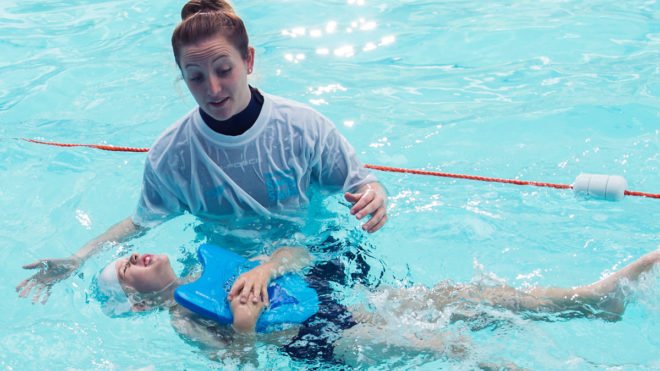Even in the winter, the swimming pool sport remains very popular and covered swimming pools are everywhere. If you do this correctly, the benefits of swimming for the body are innumerable and it is a very safe sport and is recommended for all ages.
Even in the winter, the swimming pool sport remains very popular and covered swimming pools are everywhere. If you do this correctly, the benefits of swimming for the body are innumerable and it is a very safe sport and is recommended for all ages.
The benefits of swimming for the body and the soul are innumerable
In fact swimming is one of the most healthy and safe sports. During swimming, the various joints in the body bear the minimum burden. The heart and blood organs exert a constant and moderate effort, which can improve the capacity of the heart and lungs, reduce back pain, reduce Blood pressure and lowering cholesterol levels.
Water resistance leads to a moderate effort of muscle which not only makes it more powerful but also contributes greatly to increasing its elasticity. Swimming activates all muscles in the body especially the back, abdominal muscles and legs. Swimming also helps asthmatics to strengthen the lungs and increase their carrying strength. In addition to the great benefit of blood, heart and lung, the risk of swimming is low (but it is), it helps to reduce weight, stability and rehabilitation of injuries. Swimming is a calming and positive psychological effect because of the physical effort that improves mood like other sports, especially because of the feeling of buoyancy.
Start swimming
Not all swimming exercises are similar in nature. For beginners, it is recommended to start with a back or cross-legged swimming pool where in these ways the head is directed to the air and there is no need to exhale air into the water. The most advanced swimmers usually move to the conventional side-hopping style swim, chest-up and even butterfly
The most difficult part of learning to swim is breathing control. Before jumping into deep water, breathing is recommended in shallow water. Practice breathing out of the nose and mouth under the water several times, so you can feel the water resistance to exhaling, and get used to the pressure you should put on the diaphragm and lungs. Breathe from the nose above the water - and bring the air under the water again. Exercise it until you feel
comfortable.Cons of swimming
Besides the benefits of swimming for the body, swimming sports also have negative, but not important, but it must be taken into account. It is difficult to swim for long periods of time. This is a monotonous sport and access to the swimming pool is often stressful and requires changing clothes, finding parking space for the car, appliances and even a subscription ticket that may be expensive. Another negative feature is the difficulty in gaining access to a rapid heartbeat such as exercise or cycling, so some see it as less stimulating than a more demanding sport.
The most recent negative feature is the difficulty of having a diet with swimming. Swimming often increases appetite due to changing temperature and the body's need to warm itself and actually increase food intake, which reduces the chances of success of diet.
Swimming injuries - there is something like that
Swimming can also lead to injuries, but they are few compared to the benefits of swimming for the body and compared to other sports where it is extremely easy to avoid. Incorrectly swimming, which is caused by a wrong habit, can cause pressure on the neck area. This happens most often when the mouth is directed out of the water to breathe in different ways.
The burden of unattended exercise may also cause muscle tension, because the underwater effort seems very little. Changes in temperature after entry into the water lead to the injury of many colds and improper maintenance of swimming water may sometimes lead to infection of the eyes and ears.
But swimming is still considered healthy and highly recommended. If you exercise properly and according to your physical condition, you will enjoy a wide variety of health benefits, from strengthening blood circulation, heart and lungs, strengthening joints and muscles, and improving flexibility. So why wait? Skip to the water!
Water bottle: Be careful to drink well while swimming, as in any other fitness training. The body loses fluid and is advised to drink every quarter of an hour to 20 minutes.
Earplugs: Not mandatory, but many use earplugs, usually made of silicone to prevent water entering the ears.
The benefits of swimming for the body and the soul are innumerable
In fact swimming is one of the most healthy and safe sports. During swimming, the various joints in the body bear the minimum burden. The heart and blood organs exert a constant and moderate effort, which can improve the capacity of the heart and lungs, reduce back pain, reduce Blood pressure and lowering cholesterol levels.

Water resistance leads to a moderate effort of muscle which not only makes it more powerful but also contributes greatly to increasing its elasticity. Swimming activates all muscles in the body especially the back, abdominal muscles and legs. Swimming also helps asthmatics to strengthen the lungs
Congratulations @mohamedrafik! You have completed some achievement on Steemit and have been rewarded with new badge(s) :
Click on any badge to view your own Board of Honor on SteemitBoard.
For more information about SteemitBoard, click here
If you no longer want to receive notifications, reply to this comment with the word
STOP